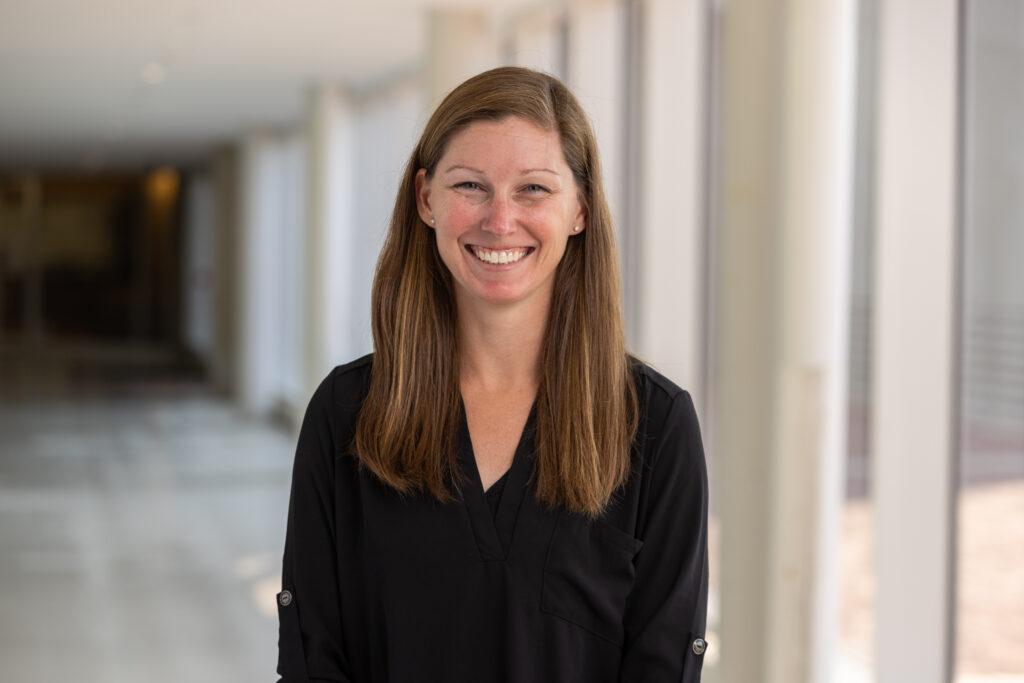Ten individuals have received the honor of being named 2021 Indiana Clinical and Translational Sciences Institute (CTSI) KL2 Early Career Investigator awardees. One of the recipients is Lauren Magee, PhD, who spent six years working at the Indianapolis Metropolitan Police Department as a crime analyst before earning her PhD in criminal justice from Michigan State University. During her studies, Magee became interested in disparities among victims and communities who experience gun violence and specifically how a public health approach may improve prevention efforts outside law enforcement.

Lauren Magee, PhD
“I study nonfatal shootings because we have a limited understanding of the determinants and effect they have on victims and communities, largely due to a lack of federal funding in the last 30 years,” said Magee, who is an assistant professor at the O’Neill School of Public and Environmental Affairs at IUPUI. “Most of what we know about firearm violence has been focused on homicides, largely due to the seriousness of those events and better data collection. There’s currently no national dataset for nonfatal shootings. Even clinical data from trauma registries or electronic health records are limited. Surviving a nonfatal shooting sometimes comes with physical disabilities and psychological effects that impact the victim, family, and community and we need to know more to better implement trauma-informed services.”
Magee’s KL2 study is called, “A Mixed-Methods Approach to Improving Behavioral Health Outcomes of Nonfatal Firearm Injury Victims.” Through her research, she wants to identify disparities and barriers to care for victims, as well as look at long-term health outcomes. This can include the people who were shot, as well as their family members and friends. Magee has a combined background in criminal justice and medicine. She completed her postdoctoral research fellowship at IU School of Medicine, focusing on children’s health services research.
“We have to take an interdisciplinary approach to gun violence because it’s a multifaceted issue,” said Magee. “My background as a criminologist brings more of a cultural neighborhood context, understanding the social dynamics that happen in people’s lives that may impact the way they utilize the clinical systems, such as why they may or may not trust a physician or a police officer who is interviewing them in the emergency department. I want to understand how we can better connect victims and families with needed behavioral health services. I have partnered with a local community group to conduct interviews of victims and caregivers to ensure the findings and implications are relevant to the needs of victims and communities who experience gun violence daily.”
Magee said they are still working to understand how the COVID-19 pandemic has impacted nonfatal shootings. She said preliminary results show that it has certainly made a difference in how many shootings there have been, as well as who has been targeted.
“We’ve seen an increase in female victims and older victims, and we need to know more about how the current increase in gun violence that we’re seeing in Marion County is changing and evolving throughout this pandemic,” said Magee. “We need to better understand the full health impact on communities and individuals due to gun violence during this pandemic and ensure we have the appropriate trauma-informed services available to such communities.”
Magee’s previous work primarily focused on Marion County, through partnerships with the police department and clinical systems, but she hopes to expand to statewide and national efforts in the future. Her research was most recently published in the journal, Homicide Studies, sharing insights about the geographic differences in gunshot wound mortality and other neighborhood social factors.
Other researchers who were named 2021 Indiana CTSI KL2 Early Career Investigator awardees include:
- Ephrem Abebe, PhD, Purdue University, “A Systems Approach to Improve Medication Safety During Care Transitions for Children with Medical Complexity”
- Michael Bushey, MD, PhD, IU School of Medicine, “Collaborative Care for Opioid Dependence and Pain (CCODAP) Pilot Study”
- Allyson Dir, PhD, IU School of Medicine, “Feasibility of Parent Navigator Program among Justice-Involved Youth”
- Danielle Janosevic, DO, IU School of Medicine, “The spatial and temporal signature of sepsis-associated acute kidney injury”
- Monica Kasting, PhD, Purdue University, “Developing an Intervention to Increase Hepatitis C Virus Screening among Baby Boomers in Primary Care”
- Jennifer Maratt, MD, IU School of Medicine, “Improving Endoscopy Efficiency through Patient Engagement”
- Veronica Derricks, PhD, Purdue University, “Developing an Intervention to Improve the Delivery of Targeted Health Messages about HIV Prevention to Black Americans”
- Jamie Felton, MD, IU School of Medicine, “Type I interferons (IFN) and B cell metabolism as drivers of type 1 diabetes (T1D)”
- Lorenzo Lorenzo-Luaces, PhD, IU-Bloomington, “Leveraging computational social sciences and natural language processing to optimize engagement and response to low-intensity CBT for depression and anxiety”
Each KL2 awardee receives $7,200 in pilot funding annually, which may be spent on their research project and travel to the annual national Association for Clinical and Translational Science (ACTS) meeting each spring to present their research.
The Indiana CTSI is currently accepting applications for the 2022 KL2 awardees. Interested applicants are encouraged to submit their CV to Patricia McGuire for eligibility pre-screening by December 15, 2021. Find more information about the program here.
